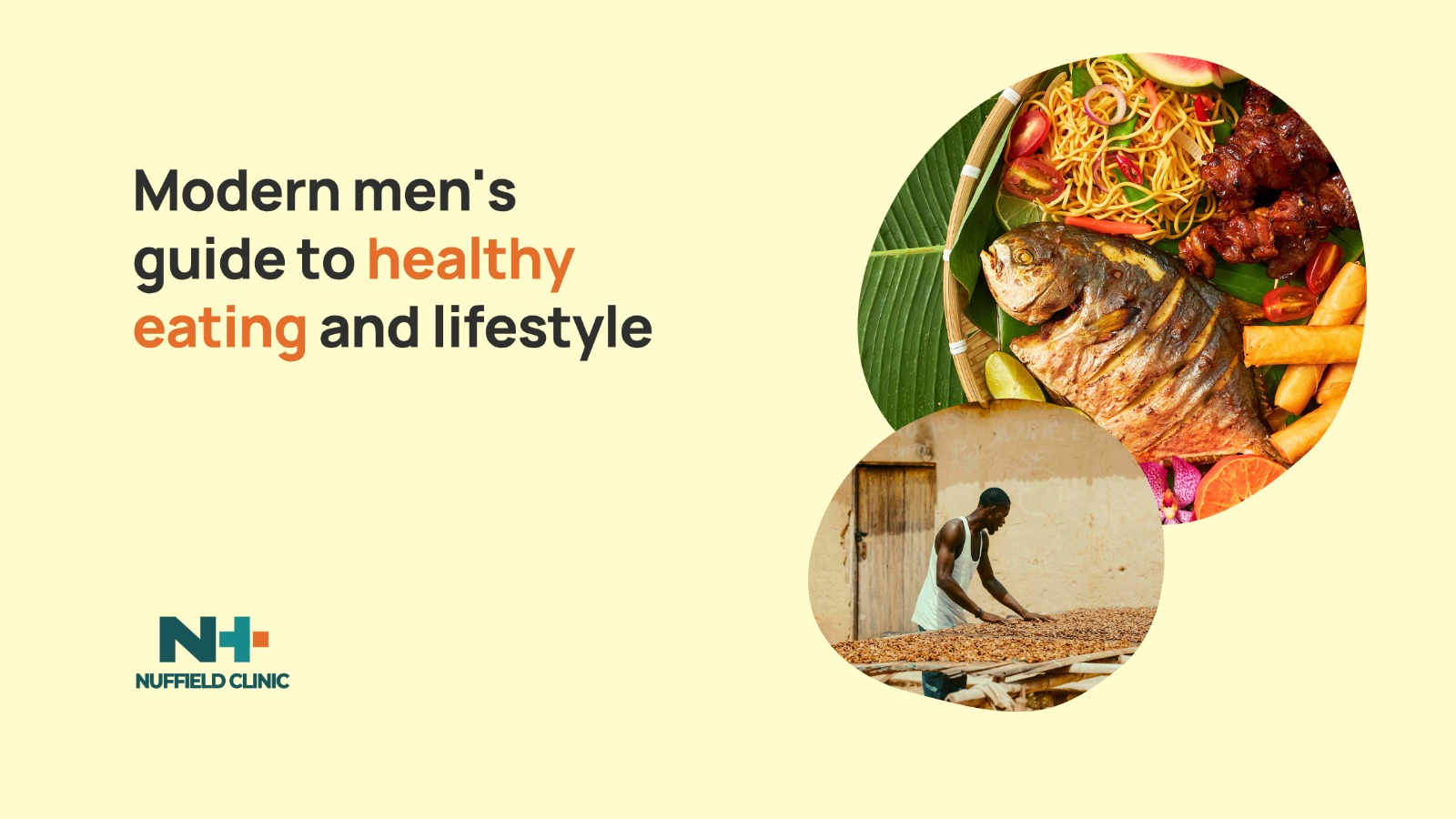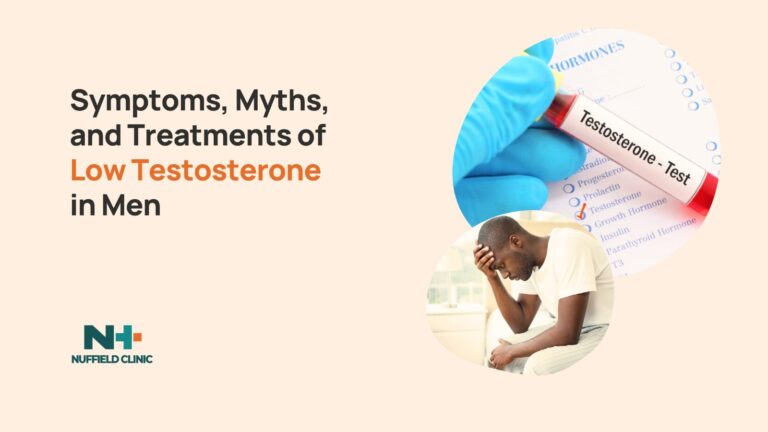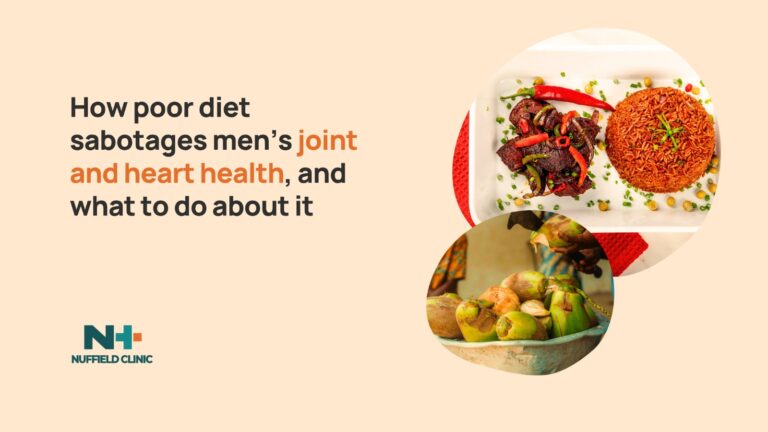Men’s guide to healthy eating and lifestyle

Is there a way to improve your eating and lifestyle as a man? Modern men face a growing challenge, including how to remain healthy and energised amid the demands of career, family, and ageing. If you’re a man navigating the pressures of modern life, whether in your thirties or approaching retirement, this article is crafted specifically for you.
See also: How poor diet sabotages men’s joint and heart health, and what to do about it
At Nuffield Clinic, we believe that understanding how to eat, move, and live well isn’t merely a health trend; it’s a survival skill. This briefing synthesises robust, evidence-based insights on how diet and lifestyle uniquely affect men’s physical well-being, particularly in the domains of joint and heart health, energy, immunity, and longevity.
This article is not about quick fixes or trendy diets. It’s a detailed, journalistically rigorous examination of what your body needs, what most men are lacking, and how Nuffield Clinic’s professional nutrition and wellness services can guide you toward sustained vitality.
Men’s nutritional needs
Biologically, men require more fuel. Higher muscle mass and distinct hormonal profiles, particularly testosterone, mean men need more calories, more protein, and specific micronutrients to function optimally.
An active man over 40 may require between 2,400 to 2,800 calories daily, while sedentary counterparts need approximately 2,000 to 2,200. But it’s not just about calories; it’s about what composes them.
Protein remains indispensable, not only for muscle preservation but for hormonal health. Experts recommend 0.36 grams per pound of body weight at minimum, and up to 2.0 grams per kilogram for active men. Lean meats, eggs, lentils, Greek yoghurt, and beans offer not just sustenance but structural support.
Micronutrients deserve equal attention. Calcium and vitamin D, for instance, play an integral role in bone density, a crucial factor as men age and the risk of fractures or osteoporosis grows. Potassium helps regulate blood pressure, counteracting the salt-saturated diets common today. Selenium, often overlooked, may reduce the risk of prostate cancer, and zinc, vital for testosterone and immunity, is commonly deficient in male diets.
Magnesium, a key agent in over 300 metabolic processes, regulates blood pressure and bolsters neuromuscular health. Meanwhile, B-complex vitamins drive energy metabolism and cognitive clarity, especially crucial as stress and age tax the nervous system. For men over 50, B12 absorption declines, necessitating greater dietary care or supplementation.
And then there’s fibre, often neglected. Men under 50 require 38 grams daily; those older, at least 30 grams. Yet many fall short, opening the door to cardiovascular issues, metabolic dysfunction, and chronic constipation.
Omega-3 fatty acids, found in fatty fish and certain seeds, provide anti-inflammatory benefits that not only improve cardiovascular resilience but also support joint mobility and brain function. Without these, the risks of inflammatory diseases, including arthritis and heart disease, are markedly higher.
Healthy diet for men
A healthy male diet must go beyond macronutrient balance. It should be anti-inflammatory, antioxidant-rich, and designed to minimise the intake of pro-inflammatory agents, especially sugars, trans fats, and refined starches.
Vegetables and fruits should form the backbone of the diet, with at least five servings a day, to reduce disease risk and enhance immune capacity. Whole grains such as oats, brown rice, and wholegrain bread help stabilise blood sugar, lower LDL cholesterol, and reduce systemic inflammation.
Proteins should be lean: poultry, fish, eggs, and legumes. Dairy, preferably low-fat, provides necessary calcium and vitamin D.
Fats require special scrutiny. Saturated fats, abundant in fast food and processed snacks, are inflammatory culprits. In contrast, monounsaturated fats from avocados, nuts, and olive oil support heart health and improve cholesterol profiles. For heart protection, saturated fat should remain under 10% of daily caloric intake.
Hydration is another pillar. Water supports digestion, temperature regulation, and detoxification. Aim for at least two litres daily, and choose water over sugary drinks. A slice of lemon or mint can add refreshing flavour without compromising your goals.
Limit “extras”: chips, sweets, fried foods, pastries, sugary drinks. These foods inflame your arteries, burden your joints, and quietly erode your long-term health.
Strategies for busy men
A major barrier to healthy living is not ignorance but implementation. Time-strapped routines often sabotage even the best intentions. To combat this, men must adopt smart, structured strategies.
Meal planning is foundational. Planning your meals reduces impulsive eating and encourages variety. Batch cooking can provide healthy lunches and dinners for several days, reducing reliance on unhealthy takeout.
Meal kits tailored for men’s nutrition offer balanced portions while accounting for calories, protein, and macros. Nuffield Clinic can recommend or help create plans based on your schedule, health goals, and fitness levels.
At mealtime, portion control matters. Using smaller plates and plating meals, even snacks, helps prevent unconscious overeating. Eating slowly allows your brain to register fullness, often preventing calorie excess. Listening to hunger cues, rather than stress or boredom, can realign your eating with your actual needs.
Keep healthy snacks within arm’s reach: Greek yoghurt, protein shakes, nuts, or sliced vegetables. Hunger doesn’t have to lead to sabotage if you’re prepared.
And never underestimate the value of a good breakfast. Skipping it can lead to energy crashes, irritability, and overeating later. Start with nutrient-dense meals like oatmeal with walnuts or a vegetable omelette to set the tone for the day.
When eating out, be strategic. Choose grilled proteins and vegetables over fried or breaded options. Request sauces and dressings on the side. If portions are excessive, ask for a takeaway box upfront to control consumption.
Most importantly, remember that change need not be dramatic to be effective. Replacing soda with water or adding an extra vegetable to your lunch can mark the beginning of transformation. Sustainable health stems from steady habits, not radical swings.
Lifestyle considerations
Healthy eating does not exist in a vacuum. Diet interlocks with other habits to form the totality of well-being.
Exercise remains indispensable. At least 30 minutes most days, whether walking, swimming, or strength training, helps maintain weight, improve insulin sensitivity, and protect cardiovascular and musculoskeletal health. HIIT workouts offer efficient solutions for busy schedules.
Weight management is essential. Men over 40 tend to accumulate visceral fat, linked to insulin resistance, inflammation, and heart disease. Caloric control, paired with physical activity, reverses these risks.
Alcohol, while socially accepted, must be moderated. Beyond adding empty calories, it can exacerbate high blood pressure and liver strain. Limit intake to two standard drinks per day, and avoid binge consumption altogether.
Smoking cessation should be a priority. Few habits are as detrimental to vascular and respiratory health. Quitting smoking reduces the risk of heart disease, stroke, and numerous cancers almost immediately.
Sleep is another keystone. Seven to nine hours nightly supports muscle recovery, hormonal balance, and immune integrity. Chronic sleep deprivation contributes to weight gain, irritability, and disease vulnerability.
Routine medical check-ups ensure early detection of risks—be they cholesterol imbalances, prostate irregularities, or metabolic dysfunctions. Dental, vision, and bone density screenings are also crucial.
Mental engagement matters. Crosswords, hobbies, and continual learning delay cognitive decline and enhance quality of life. Equally important are safe sexual practices, especially for men with multiple partners.
Above all, do not go it alone. Whether you are managing arthritis, pre-diabetes, or simply trying to feel better, professional guidance is a powerful ally.
How Nuffield Clinic can help
Navigating nutritional advice online can be overwhelming and conflicting. That’s why Nuffield Clinic offers tailored diet and nutrition consultations, designed specifically for men.
Our registered dietitians and physical therapists work collaboratively to create real-world strategies suited to your physiology, preferences, lifestyle, and medical history. We help you interpret bloodwork, choose supplements wisely, manage weight, reduce inflammation, and strengthen joints through food, not guesswork.
At Nuffield Clinic, we are committed to walking this path with you, with clarity, professionalism, and respect for your individual journey.
Schedule a nutrition and lifestyle consultation with us today, and take the first step toward a stronger, healthier you.







